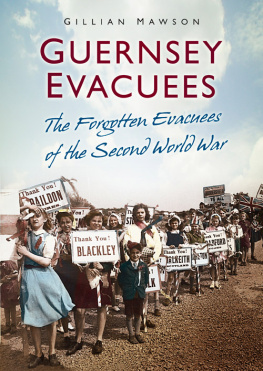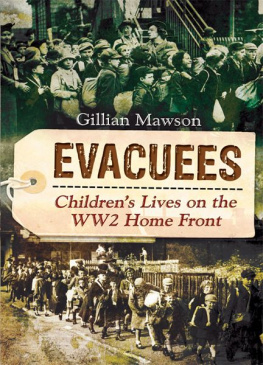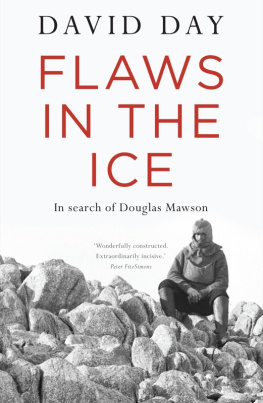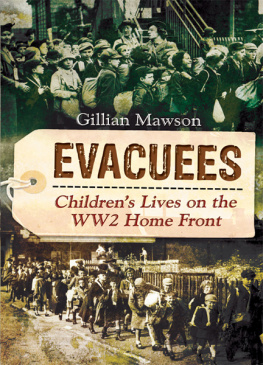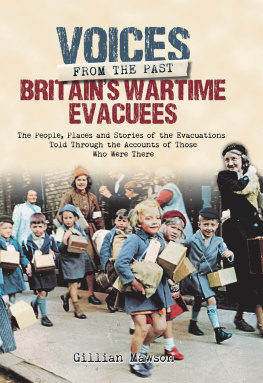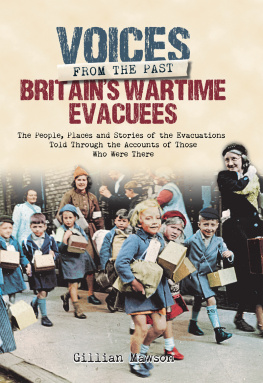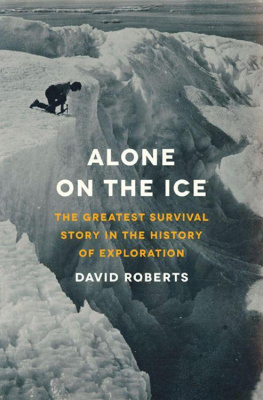Gillian Mawson - Guernsey Evacuees
Here you can read online Gillian Mawson - Guernsey Evacuees full text of the book (entire story) in english for free. Download pdf and epub, get meaning, cover and reviews about this ebook. year: 2012, publisher: The History Press, genre: Home and family. Description of the work, (preface) as well as reviews are available. Best literature library LitArk.com created for fans of good reading and offers a wide selection of genres:
Romance novel
Science fiction
Adventure
Detective
Science
History
Home and family
Prose
Art
Politics
Computer
Non-fiction
Religion
Business
Children
Humor
Choose a favorite category and find really read worthwhile books. Enjoy immersion in the world of imagination, feel the emotions of the characters or learn something new for yourself, make an fascinating discovery.
- Book:Guernsey Evacuees
- Author:
- Publisher:The History Press
- Genre:
- Year:2012
- Rating:3 / 5
- Favourites:Add to favourites
- Your mark:
- 60
- 1
- 2
- 3
- 4
- 5
Guernsey Evacuees: summary, description and annotation
We offer to read an annotation, description, summary or preface (depends on what the author of the book "Guernsey Evacuees" wrote himself). If you haven't found the necessary information about the book — write in the comments, we will try to find it.
Gillian Mawson: author's other books
Who wrote Guernsey Evacuees? Find out the surname, the name of the author of the book and a list of all author's works by series.
Guernsey Evacuees — read online for free the complete book (whole text) full work
Below is the text of the book, divided by pages. System saving the place of the last page read, allows you to conveniently read the book "Guernsey Evacuees" online for free, without having to search again every time where you left off. Put a bookmark, and you can go to the page where you finished reading at any time.
Font size:
Interval:
Bookmark:

M y grateful thanks to the following: the evacuees and their families who have shared their wonderful stories and personal documents with me over the past four years. Please be assured that, should your story not be mentioned in this book, it will be used in many other ways, to tell people of all ages about your wartime experiences. I also wish to thank: my family and friends for their never-ending support and encouragement; Michelle Tilling and all at The History Press; Sir Geoffrey Rowland (Bailiff of Guernsey 200512) and Lady Diana Rowland; Deputy Mike OHara (Minister of Culture and Leisure, Guernsey) and Teresa OHara; Mrs Joan Ozanne and her family; Jim Cathcart, and all at BBC Guernsey; Amanda Bennett and all at the Priaulx Library, Guernsey; Darryl Ogier and all at the Island Archives, Guernsey; Di Digard and all at Guernsey Press and the Guiton Group; The March Fitch Fund, who kindly assisted me with research expenses; Joanne Fitton, Leeds University Archives; Joanne Dunn, Sue Shore, Sue Heap and all at Stockport MBC who have worked with me; Dawn Gallienne, Guernsey Post; Michael Paul and the Guernsey Society; Peter Trollope, BBC Television; Raymond Ashton; Donna Hardman, Bury Archive Service; Derek and Gillian Martel; Dot Carruthers, Elizabeth College Archive; The Second World War Experience Centre; Guernsey Retired Teachers Association; Richard Heaume, German Occupation Museum; Renee Holland; Barbara and Mike Mulvihill; Emily McIntosh; Sarah Yorke, UNLtd; The family of the late Maureen Muggeridge; The family of the late Brian Ahier Read; Professor Penny Summerfield; Julie Anderson; Neil Pemberton; Jean Cooper; Ann Barlow; Linne Matthews; Lisa Greenhalgh; Suzanne Spicer; Debra Dickson; Christopher Thorpe; Alice McDonnell; Val Harrington; Fiona Kilpatrick; Rosemary and Robin Wignall; Caroline and Chris Worrall and my colleagues at the University of Manchester. My apologies to those who are not mentioned here, but who are certainly not forgotten!
I n 2008 I set out to examine the experience of evacuated Guernsey civilians, and to give these evacuees, who have largely been forgotten by historians, a voice. I was able to interview people in Guernsey, together with many that had remained in England after the war. I was also able to interview some who were young mothers during the evacuation, and their stories were particularly moving. Sadly a great many evacuees had passed away by the time I began my research, research which was very emotional and created close relationships with some of my interviewees. It also led to my involvement in a number of events which marked the seventieth anniversary of the evacuation in 2010, which changed my life completely.
My childhood was left inside.
when I closed my bedroom door.
In the hall, distraught, father waits, mother weeps.
The dog unaware, wags his tail
and licks the tears from my face.
Reluctantly we speed to the harbour.
The smell of tobacco smoke on
fathers jacket will remain with me.
On the ship we say goodbye, perhaps forever.
I feel empty like a shell.
O n 28 June 1940, at about 6.30 p.m., German aircraft appeared over the island of Guernsey. At the time Valerie Pales was helping her mother to harvest their potato crop, and recalls:
One plane broke away from the others and started machine-gunning our field, we could hear the bullets breaking panes of glass in our glasshouse and were worried that my father was in there, luckily he was in a brick-built shed. My mother hurried me to our house to shelter under the stairs. Father joined us and said that my mother and I would be safer in England, so they packed a few belongings into their car and drove to the harbour.
It was a savage raid, as the aircraft dropped bombs on the pier and town, then swooped down to machine-gun the streets around the harbour, apparently assuming that the tomato lorries lined up at the harbour contained ammunition. Most of the lorry drivers had crawled under their vehicles for shelter, and when the lorries were hit, they were trapped underneath. An RAF Air Ministry report noted a similar attack on the island of Jersey and listed the casualties as follows Jersey: 3 dead, Several wounded, Guernsey: 23 killed, 36 wounded.
Private Board of the St Johns Ambulance Brigade arrived at the harbour a few minutes later:
Everything was in chaos, the produce lorries had been transferred into a line of fire our number 2 ambulance, the best one in the island, was against the kerb, every bit of glass smashed, and the sides and back doors riddled with shrapnel and bullet holes one patient had been killed as he lay on the stretcher the attendant was severely injured.
The only defence the island had at the time was a Lewis gun on the Isle of Sark mail boat, which had recently arrived to take evacuees to England. As the air raid commenced, evacuees were still boarding, and Mrs Trotter wrote later:
We had just sat down in the lounge when we heard terrific explosions! 50 minutes of terror followed! I stayed with the children whilst my husband went up top to offer assistance with the Lewis gun. The boat shook and trembled but luckily was not hit. Our guns were the only protection the island had. I later came up to find tomato lorries ablaze on the harbour and some people had been killed.
The raid continued until about 8.00 p.m., at which point the Sark s Captain Golding asked those around the jetty if they wished to board his boat. The Pales family boarded, along with many others who had suddenly decided to leave the island. The ship prepared to leave Guernsey at 10.00 p.m. with 647 passengers, 200 more than Captain Golding had originally planned to carry. Somehow Valerie Pales became separated from her mother, and as the boat started to pull away, she recalled:
My mother was on the boat, screaming out that she had lost her child. Luckily somebody picked me up after the gangway had been pulled up, and managed to hand me over the ships rail to my distraught mother. I believe I was the last child evacuee to leave Guernsey.

Valerie Pales.
In early 1940, the Channel Island of Guernsey was home to around 40,000 people, whose income came mostly from tourism, fishing, horticulture and agriculture. The island is about 30 miles from the French coast, and 70 miles from Englands south coast. In 1940, the majority of Guernseys residents were born there, but English people had been drawn to the warmer climate and the opportunities for agriculture. Loyal to the British crown since AD 933, the Channel Islands originally belonged to the Duchy of Normandy, but when William became King of England in 1066, he continued to rule the Channel Islands as Duke of Normandy. The mainland of Normandy was lost to England in the thirteenth century but the islands remained loyal to Englands King John. A British governor had been living in Guernsey since 1486, and the British flag was flown on the island, together with the Guernsey flag. God Save the King was Guernseys national anthem too, and Joan Ozanne recalls, it was sung before every cinema and theatre show. The inhabitants perceived themselves, not just as residents of Guernsey, but also as British:
If there are two qualities upon which Channel Islanders pride themselves, they are their loyalty and their independence. These qualities they possess in common with all the British race.
From the moment that Germany invaded France in May 1940 , those living in the nearby Channel Islands of Guernsey, Jersey, Alderney and Sark were unsure whether their islands would be attacked or ignored by Hitler. However, in early June, as France began to fall, and British troops retreated to England, French refugees began to arrive in Guernseys main harbour, St Peter Port. Fears arose that a German invasion might indeed take place, as the closeness of Guernsey to Cherbourg meant that the island was wide open to attack by German forces both by sea and by air. The Revd W.H. Milnes, the Principal of Elizabeth College, visited the Governor of Guernsey to express his fears that the island might be occupied, and to ask whether any plans were in hand for the evacuation of Guernseys schoolchildren, stating later:
Next pageFont size:
Interval:
Bookmark:
Similar books «Guernsey Evacuees»
Look at similar books to Guernsey Evacuees. We have selected literature similar in name and meaning in the hope of providing readers with more options to find new, interesting, not yet read works.
Discussion, reviews of the book Guernsey Evacuees and just readers' own opinions. Leave your comments, write what you think about the work, its meaning or the main characters. Specify what exactly you liked and what you didn't like, and why you think so.

